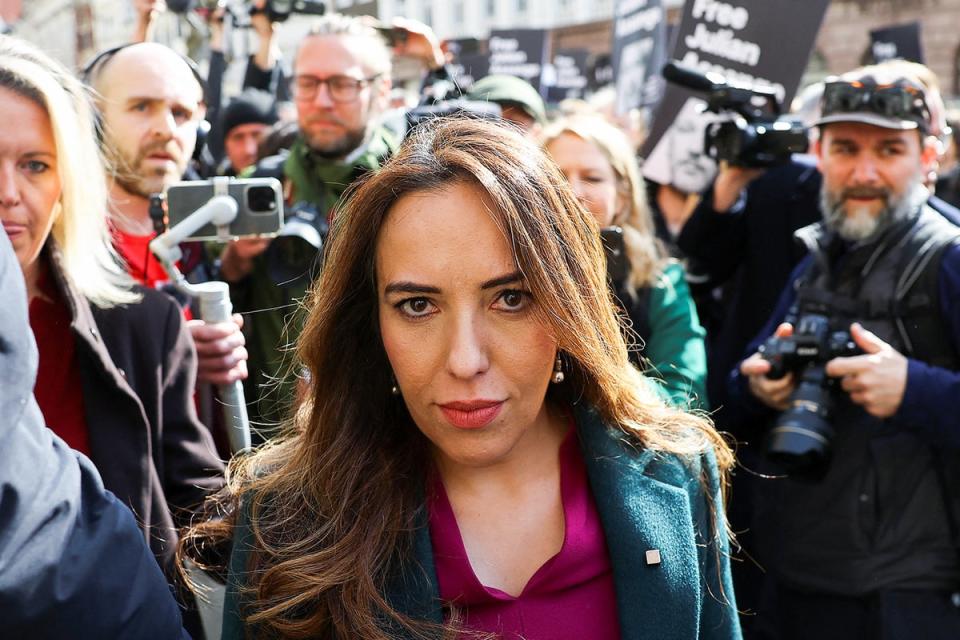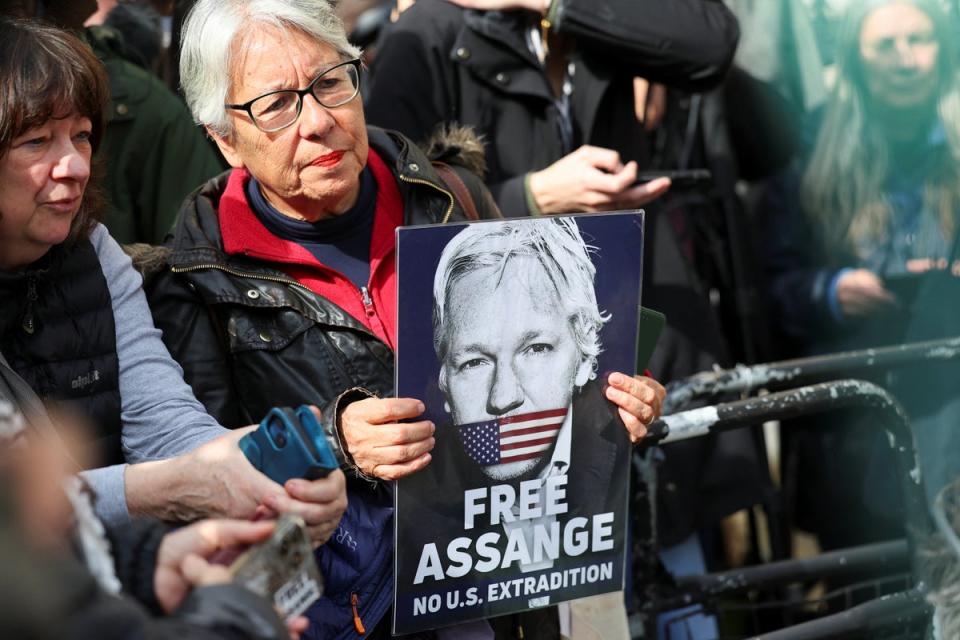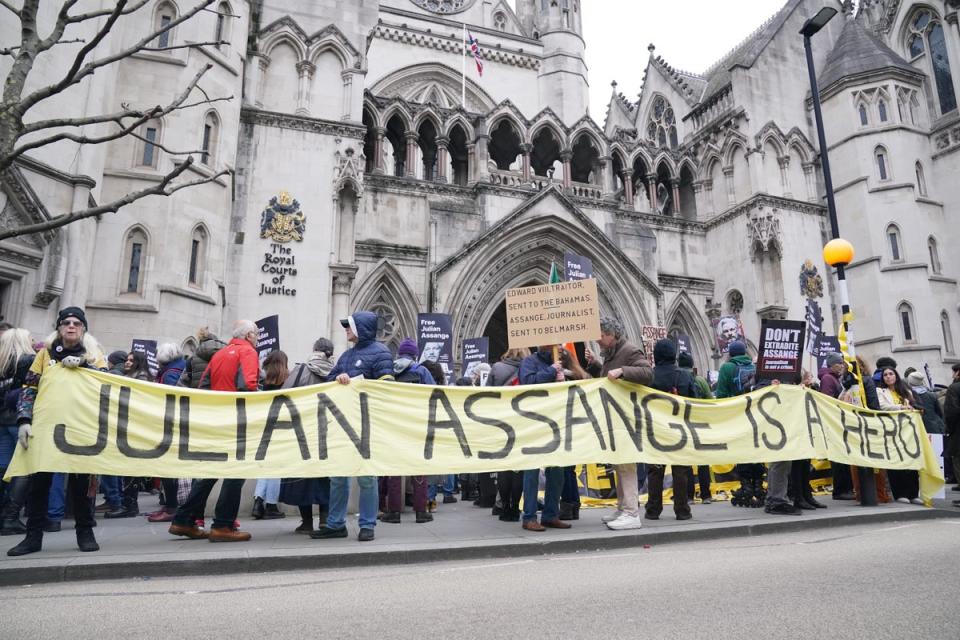WikiLeaks founder Julian Assange will not be extradited immediately as decision delayed
Julian Assange will not immediately be extradited to the US to face espionage charges, after judges delayed a final decision over whether he can appeal his case.
It was feared that the WikiLeaks founder, who is currently detained at Belmarsh high-security prison, could have been put on a plane in a matter of days if a last-ditch legal bid for an appeal failed.
His team claim that the 52-year-old could face up to 175 years in prison if he is convicted of publishing hundreds of thousands of leaked documents relating to the Afghanistan and Iraq wars. They argue that the decision to prosecute him is “state retaliation” for his political views.
In a January 2021 ruling, district judge Vanessa Baraitser said that Mr Assange should not be sent to the US, citing a real and “oppressive” risk of suicide, while ruling against him on all other issues.
But later that year, the US authorities won their High Court bid to overturn this block, paving the way towards Mr Assange’s extradition.
During a two-day hearing in February, lawyers for the 52-year-old asked for the go-ahead to challenge the original judge’s dismissal of other parts of his case, in an effort to prevent his extradition.
They argued that he was being prosecuted in retaliation for his political views, meaning it would be unlawful to extradite him under UK law. Mark Summers KC told the court: “This is a paradigm example of state retaliation for the expression of political opinion.”
But judges announced on Tuesday that the 52-year-old would not be immediately extradited, and offered the US government and the US secretary of state three more weeks to provide the court with satisfactory assurances.
Dame Victoria Sharp and Mr Justice Johnson dismissed most of Mr Assange’s legal arguments, but said that unless assurances were given by the United States, he would be able to bring an appeal on three grounds.
The judges said the US authorities had three weeks to give those assurances – with a final decision to be made in late May.

In a 66-page ruling, Dame Victoria, who is president of the King’s Bench Division of the High Court of Justice, said: “Before making a final decision on the application for leave to appeal, we will give the respondent an opportunity to give assurances. If assurances are not given then we will grant leave to appeal without a further hearing.
“If assurances are given then we will give the parties an opportunity to make further submissions before we make a final decision on the application for leave to appeal.”
The assurances requested include that Mr Assange is not prejudiced at trial (including sentence) by reason of his nationality, that he is afforded the same first-amendment protections as a United States citizen, and that the death penalty is not imposed.
The judges rejected Mr Assange’s lawyer’s claims that he was being prosecuted for his political opinions and would not face a fair trial.
However, they said he could be granted leave to appeal on the grounds of Article 10 of the European Convention on Human Rights, which relate to freedom of expression, if he is treated as a foreign citizen in a US court. The judges therefore asked for assurances that he will be entitled to rely on the country’s first-amendment protections.
They also warned that without adequate assurances from the US, Assange could be granted leave to appeal on the grounds that he could face charges that carry the death penalty.

Speaking after the judgment, Mr Assange’s wife Stella said: “What the courts have done has been to invite a political intervention from the United States... to send a letter saying ‘It’s all OK.’ I find this astounding.
“This case is a retribution. It is a signal to all of you that, if you expose the interests that are driving war, they will come after you, they will put you in prison and will try to kill you.
“The Biden administration should not issue assurances. They should drop this shameful case that should never have been brought.”
Although the WikiLeaks founder was granted permission to leave prison for the two-day hearing last month, he was too unwell to attend.
Hundreds of supporters rallied outside the Royal Courts of Justice chanting “Free, free Julian Assange” and “No extradition”.
In written submissions, Mr Summers and Edward Fitzgerald KC, for Mr Assange, had argued that the US was trying to suppress those who were “willing and prepared” to hold officials to account for alleged wrongdoing during the “war on terror”. “Mr Assange was one of those targets,” they said.
However, lawyers for the US said Mr Assange had put lives at imminent risk by publishing the names of those who had helped the country in unredacted classified documents in “one of the largest compromises of classified information in the history of the United States”.

“These were documents that disclosed to the world the unredacted names of human sources who had provided information to the US,” Clair Dobbin KC told the court, adding that this separates Mr Assange from The New York Times and other news outlets, which also published information exposed by WikiLeaks.
Mr Assange’s wife previously warned that the outcome of the appeal bid is life or death for her husband – whose health has deteriorated in prison, where he spends 22 hours a day in confinement.
The Australian national has been in prison since he was removed from the Ecuadorian embassy in 2019.
More follows on this breaking news story...


